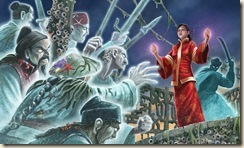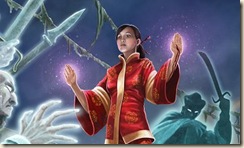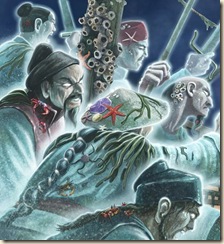One of the things that I always counsel aspiring writers is that this is no business to be in if you're one of those people who likes instant gratification.
I now have the perfect example of that.
I started getting serious about writing fiction around 2005. No, that's not quite true; I had been serious about writing it for at least twelve years before that. But I started getting serious about letting other people read it around 2005. I started getting serious about thinking that maybe, just maybe, I could get paid for letting other people read it.
not quite true; I had been serious about writing it for at least twelve years before that. But I started getting serious about letting other people read it around 2005. I started getting serious about thinking that maybe, just maybe, I could get paid for letting other people read it.
So in October 2005 I sent out my very first ever submission, to a new market that had just been announced - Orson Scott Card's Intergalactic Medicine Show. The story was a short piece called "The Box Of Beautiful Things", featuring a pseudo-Chinese conjuror named Yi Qin.
To my amazed delight, the following June, it was accepted, and published shortly thereafter. The fact that I had sold to a professional magazine right out of the gate was not something I had ever expected. But I had already started sending out a few other stories. In May 2006 I submitted two other stories featuring the same character. One - "The Man Who Was Never Afraid" - went to Abyss and Apex, the other was called "What The Sea Refuses" and went to Black Gate.
They were accepted, too. That meant I had sold three of my first six  submissions. It has, of course, become harder and harder ever since, but that's another story. I was lucky; I hit the right markets with the right stories and it gave me the confidence (I am not, by nature, a self-confident person) to keep going even through long, lean spells of rejection after rejection after rejection.
submissions. It has, of course, become harder and harder ever since, but that's another story. I was lucky; I hit the right markets with the right stories and it gave me the confidence (I am not, by nature, a self-confident person) to keep going even through long, lean spells of rejection after rejection after rejection.
But: back to that Black Gate sale. Black Gate was a beautiful magazine; great production values, and its emphasis on "adventure fantasy" seemed to match perfectly with much of what I was writing at the time. It published some great authors and great stories and I was very pleased to sell to it.
What it was not, however, was fast.
Over the next couple of years I sold two further Yi Qin stories to Black Gate. As you may guess, this was a symptom that they stocked up on inventory. It was 2009 when I sold the third story there, but the first had yet to be published. Because one of the other stories was chronologically earlier in Yi Qin's life - and served as a much better introduction to her - the schedule was reorganised. So "What Chains Bind Us" was published in Black Gate issue 15, with "What The Sea Refuses" scheduled for issue 16.
Unfortunately... issue 15 turned out to be the last print issue published by Black Gate.
 They continued publishing fiction, but were doing so only through their website (which, incidentally, I heartily recommend; they have a raft of contributors and are one of my favourite collective blog sites in genre). Publisher John O'Neill - who I met at WFC 2011 and who is an exceptionally pleasant person - put them on the schedule but also very kindly offered me the option of delaying them to see if I could sell them elsewhere.
They continued publishing fiction, but were doing so only through their website (which, incidentally, I heartily recommend; they have a raft of contributors and are one of my favourite collective blog sites in genre). Publisher John O'Neill - who I met at WFC 2011 and who is an exceptionally pleasant person - put them on the schedule but also very kindly offered me the option of delaying them to see if I could sell them elsewhere.
So I sent "What The Sea Refuses" to IGMS, where I had tried and failed to repeat my success with "The Box Of Beautiful Things". I knew "What The Refuses", at almost 11000 words, would be a tough sell, so I trimmed it down to around 9700 and submitted it. And waited.
And then I got the response from Edmund, who really liked it... except that it was too long He suggested editing it down to somewhere around 6000 or 7000 words. He also wanted some changes to the ending and a couple of other tweaks.
I looked at the 9700 words. I am - as this blog post indicates - a naturally wordy writer. And Yi Qin is a creature of careful precision, of delicacy, of subtlety.
It was not easy. I ended up with about 7500 words. I hadn't shaved off any of the plot, I'd done the changes to the ending (which is definitely an improvement from the original; a distinct increase in tension, which is always good), and I was exhausted. I sent it to Edmund and wondered if I'd done enough.
The rest, of course, you know. I'd done enough. There was a quick round of line edits, a couple of clarifications, some removal of commas (I do overuse commas, oh yes), some subtle shifts of emphasis and tone. But it was a sale.
So a story I wrote in 2005 finally sees publication in 2013.
I'm very pleased to see it - I've always loved this story.
But, oh, what a long strange road it's been.
--Brian Dolton

